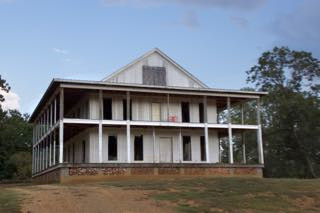Stafford Mineral Springs facts for kids
Quick facts for kids |
|
|
Stafford's Wells Hotel
|
|
 |
|
| Location | MS 1, Winona, Mississippi |
|---|---|
| Area | 6 acres (2.4 ha) |
| Built | 1890 |
| Architectural style | Stick/eastlake |
| NRHP reference No. | 00001059 |
| Added to NRHP | September 8, 2000 |
The Stafford Mineral Springs and Stafford's Wells Hotel are part of a historic resort in Montgomery County, Mississippi. This special place was built in 1890. People visited it because they believed the natural spring water had healing powers.
Contents
Stafford's Wells: A Historic Getaway
The Stafford's Wells Hotel was once a very popular place for people to visit. It was known for its natural mineral springs. These are places where water flows up from underground, often containing minerals that some people believe are good for health.
The Hotel's Early Days
The property was first built in 1890 by a doctor named Thomas Washborn. He thought the spring water could help people feel better. Later, a man named Edward Stafford and his friends took over. They started a company called Stafford Mineral Springs Company, Limited, in 1892.
A Popular Resort
Before 1916, the Stafford's Wells resort was a busy place. It had many different buildings for guests and fun activities.
- There were well houses where people could get the spring water.
- Bath houses allowed visitors to bathe in the mineral water.
- Guest cottages provided places for people to stay.
- A dance pavilion was a spot for music and dancing.
- There was even a gambling hall for entertainment.
Later on, a new place called the Stafford Springs Motor Lodge was built in the same area. This shows how the area continued to be a place for travelers and visitors over time.
Becoming a Historic Place
The Stafford Mineral Springs and Stafford's Wells Hotel are very important historically. Because of their history, they were added to the National Register of Historic Places on September 8, 2000. This list includes places in the United States that are important to history, architecture, archaeology, engineering, or culture. Being on this list helps protect these special sites for future generations to learn about and enjoy.


